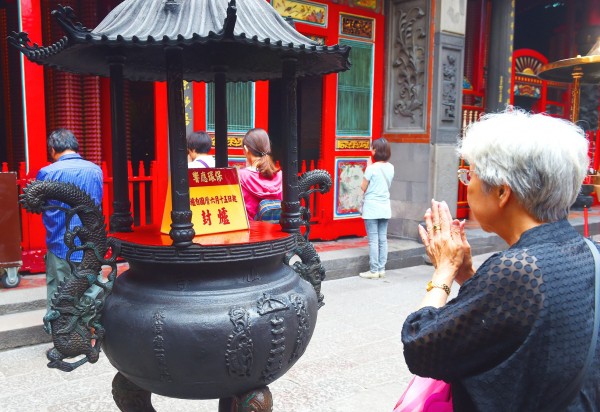《TAIPEI TIMES 焦點》 Longshan Temple halves censers used in worship

A woman prays before a sealed incense burner in Taipei’s Longshan Temple yesterday. The number of censers in use at the temple has been cut from seven to three to reduce the amount of air pollution in the area. Photo: Chien Jung-fong, Taipei Times
SPIRITUAL POLLUTION: The policy change follows earlier measures to cut the number of sticks used in worship, as well as refusing to accept donated incense
By Abraham Gerber / Staff reporter
Longshan Temple (龍山寺) in Taipei yesterday closed access to more than half of its censers following concerns over incense smoke polluting the surrounding area.
Red lids capped four of the temple’s seven censers, as the temple prepared to move them into storage.
“Doctors at National Taiwan University found that PM2.5 levels near the temple had reached frightening levels,” temple affairs manager Chang Hsueh-ling (張雪玲) said. “Longshan Temple’s deity is full of mercy and wants worshipers to be healthy and at peace.”
Chang said the temple’s board had cast lots three times to ask the permission of Longshan’s main deity — Kuanyin, the goddess of mercy — before passing the new policy.
Located in Taipei’s historic Wanhua District (萬華), the temple has become one of the city’s largest and most famous since it was established in 1738.
A study by National Taiwan University Hospital last month found that levels of airborne particles measuring 2.5 micrometers or less around the temple were 49 times higher than the city average, and 89 times higher than that around Xingtian Temple (行天宮), another famed city temple that banned incense burning last year.
Under the new policy, the temple’s lesser deities are to be allocated only one censer, while the two larger central censers devoted to the temple’s major deities are to remain. Worshipers at the temple customarily insert one stick of incense into each of the temple’s censers.
As part of the new policy, the temple will begin providing three incense sticks for free to any worshiper who requests them, Chang said.
Worshipers are also to be encouraged to use “heart incense,” because a sincere prayer would be heard with or without physical smoke, she added.
The decision to remove some of the censors follows earlier moves by the temple to cut the number of incense sticks inserted into each censer under its order of worship. The temple also stopped accepting donated incense last year due to concerns over pollution caused by poor-quality incense.
Chang said that the policy will be reviewed after three months to see how much pollution levels around the temple were reduced.
The policy change drew a mild reaction from temple worshipers.
Devotee Hsu Ming-yuan (許明源) said the temple deities care more about worshipers’ piety than whether they offer incense, money or other gifts.
新聞來源:TAIPEI TIMES
















